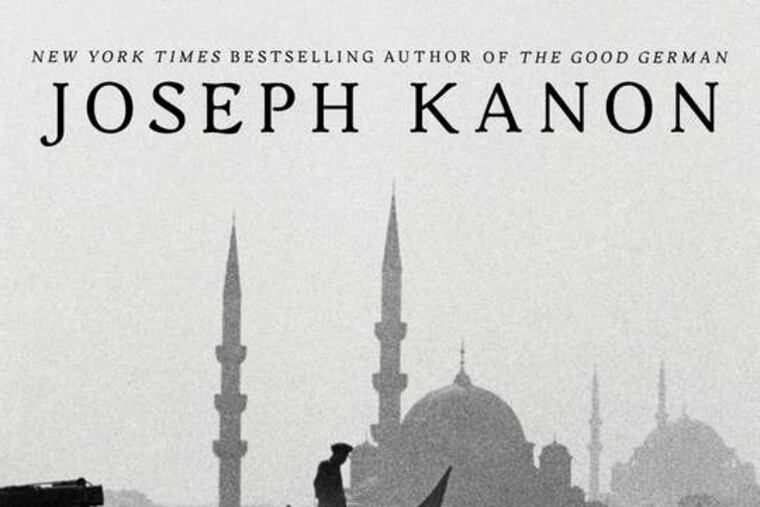‘Istanbul Passage' a thriller with characters that resonate
Istanbul Passage By Joseph Kanon Atria Books. 480 pp. $26-

Istanbul Passage By Joseph Kanon Atria Books. 480 pp. $26-
Reviewed by Rhonda Dickey
It's just after World War II, and alliances are shifting. The former friends are suspect; the former enemies may now be worth cultivating.
These shifting alliances are at the heart of this thriller, which shows once again that well-crafted popular fiction can have characters and stories that resonate.
Leon Bauer, an expatriate American working in Istanbul in the tobacco business, has been helping the U.S. war effort in a discreet way, first carrying "papers they couldn't put in the diplomatic pouch," then more. He has been working for Tommy at the consulate. Tommy has a fondness for drink, and the whiff of mystery about him. Tommy also is headed back to the States.
Tommy has one last favor to ask of Leon: watching over a man who has German aerial reconnaissance photos of the Soviet Union until the man can be spirited out of the country. The man, called Alexei, is identified by Leon's Romanian friend Mihai as Jianu, who was with Romania's fascist Iron Guard during the war. Mihai recounts an Iron Guard atrocity against Bucharest Jews that is as notable for its humiliation as its cruelty. For Mihai, who worked with Leon's German Jewish wife, Anna, to rescue refugees, it doesn't matter whether Jianu was directly involved with the atrocity, or that Jianu later changed sides (not to mention names). He's morally accountable.
But this last favor for Tommy goes disastrously wrong. Tommy is shot and killed — and the logical candidate for shooter is Leon. So Leon keeps the man he knows as Alexei stashed in Istanbul until he can get Alexei out. And for what reason? Alexei has buckets of blood on his hands. But he also has access to those photos, which would be enormously useful to the Americans.
But for Leon, the reason seems less patriotism than a sense of honor that even Leon can't articulate.
At Tommy's funeral, Leon meets Kay Bishop, the wife of a diplomat from Ankara. At the reception after the funeral, the two discuss Istanbul's sights as they fall in love. With little prompting, Leon tells Kay what he loves about Istanbul: "You're always standing on layers" — eras, religions, empires one on top of another. He could be speaking of his own life, which has become layers of loyalties. Anna is still his wife, though she lies in a clinic. She is mute and unmoored after a risky refugee rescue operation that Mihai and Anna had organized ended horribly when the overcrowded ship they used sank: "Anna had managed to save a few … but the children were gone. It must have been then, watching the debris and corpses float toward her in the ship's lights that something had broken in her too …"
Leon genuinely loves Anna, but since her incapacitation has been buying sex from a woman named Marina, telling himself it was better than having an affair — "if you paid, it didn't mean anything." So, of course, he begins an affair with Kay.
Leon has his loyalties to all these women, but as with his undercover work, it involves keeping his multiple stories straight, and keeping lots of people at arm's length.
(A quibble: Kanon's story sometimes is needlessly confusing. Characters will speak of what "he" has done and it's not clear who "he" is. Using a few more proper nouns wouldn't have clunked up the narrative.)
At every turn, in his personal and his professional life, Leon is confronted with the question, "Why am I doing this?"
Leon may remind readers of Michael Connolly, the character in Kanon's earlier novel Los Alamos. Connolly, an intelligence officer brought into the Manhattan Project, recalls a spring afternoon in Washington, and the soldier who drove down neighborhood streets delivering the dreaded news: " ... the next thing Connolly heard was a scream, a long wail that tore the air. ... That had been the afternoon he thought he had seen the war. ... It would be worth anything to end that," even an atomic bomb.
Leon might be less certain about why he's doing what he's doing than Connolly, but he's in the same moral ballpark.
In Istanbul Passage, the vise continues to tighten around Leon in ways he can see and in ways he can't. There several hands on the vise — the Americans want to find out what's going on, and so do the Soviets. And so do the Turks, including Col. Altan of the Emniyet, the secret police. As creepy a presence as Altan is, he has his reasons, too. Turkey is between a rock and a hard place — specifically, between the Soviet Union, just across the Black Sea, and the West. At the end, when the vise around Leon has taken its final twist, Altan tells him: "The empire should have been finished two hundred years ago, more. From then on, there were only bad choices. … But we survived. We found a balance between. The Ottoman solution. … Life is like that, don't you think? Mostly bad choices."